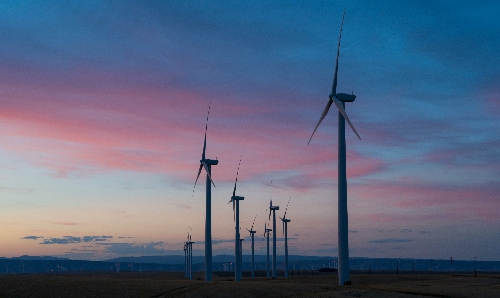Green energy transitions and global disruption: The (un)just transition to Net Zero
This 18-month project, funded by the Humanities Strategic Investment Fund, researches green energy transitions and global disruption in the transition to Net Zero.

The overall project director is Professor Matthew Paterson (SCI/Politics), and the other core team members are Professor Sam Hickey (GDI), Dr Pritish Behuria (GDI), and Dr Silke Trommer (Politics).
Others at the University will be involved in the project in more specific ways as appropriate, notably from the Sustainable Consumption Institute (SCI), Politics Department (Global Political Economy research cluster), Global Development Institute (GDI), and Tyndall Centre on Climate Change, to draw on the interdisciplinary expertise of members of the institutes.
The project has two principal aims.
First, to examine the distributive dynamics of the Green energy transitions (GETs) that are central to the global response to climate change. It focuses in particular on the disruptive qualities of GETs as well as the current geopolitical contexts in which they are unfolding.
It pursues these dynamics in four ways:
- Disruptions produced by shifts away from fossil fuels – to fossil fuel producing regions, industries dependent on fossil fuels extraction, production and export as a key feature of the domestic economy.
- Disruptions produced by shifts to renewable energy and electrification – critical minerals, geopolitical shifts, trade patterns, to meet the demands for zero carbon technology.
- Disruptions produced by ongoing global crises to these supply chains and thus to the dynamics of clean energy transitions – COVID (lockdowns and recovery), and Ukraine (natural gas inflation and supply disruption, consequent return of inflation) on the supply of clean technologies.
- Disruptions produced by the shift to industrial strategy as part of the pursuit of GETs – trade conflicts, geopolitical rivalries over resource access, notably.
Second, to develop a global network of researchers working on these as the basis for a much larger examination of the politics and political economy of GETs.
The research carried out in the project will provide the groundwork for a major application involving scholars from multiple countries, notably in both global North and South, to investigate in much greater detail the dynamics shaping the distributional dynamics of GETs.
A significant area of activity within the project will be building this research network. Existing team members already have considerable links from previous projects but this will be pursued systematically to generate external grant applications.
People
- Matthew Paterson
- Sandra Barragán
